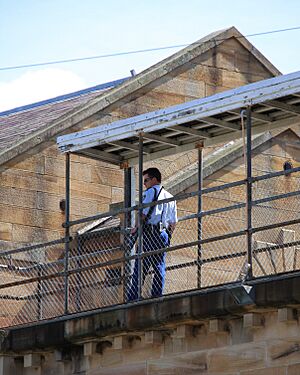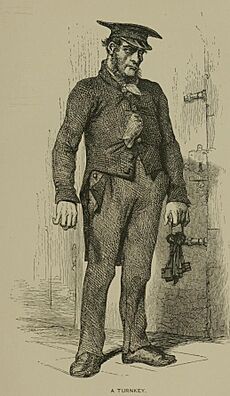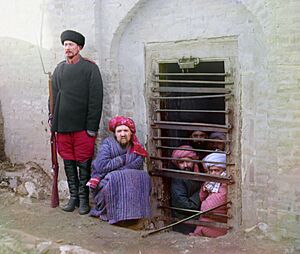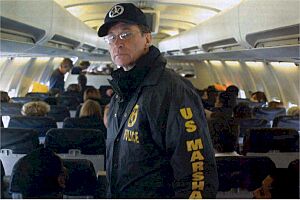Prison officer facts for kids

A prison guard on lookout in the watchtower at Parramatta Gaol
|
|
| Occupation | |
|---|---|
| Names |
|
| Employment | |
|
Activity sectors
|
Law enforcement |
| Description | |
| Competencies | See Working environment |
|
Education required
|
See Training |
|
Fields of
employment |
Prisons, jails |
|
Related jobs
|
Police officer |
A prison officer (sometimes called a corrections officer or prison guard) is a uniformed law enforcement official. Their main job is to look after prisoners in jails or prisons. They are in charge of keeping prisoners safe and making sure the facility is secure.
Prison officers also help keep order and make sure everything runs smoothly inside the prison. Most prison officers work for the government. However, some work for private companies that provide prison services.
Different Names for the Job
Over time, this job has had many different names. In the past, people used terms like "jailer" or "warder."
Today, the name for the role can depend on where you are in the world:
- In the UK and Ireland, they are called "prison officers."
- In the U.S. and New Zealand, they are often called "corrections officers."
- Australia, Canada, and Jamaica also use "correctional officer."
- Sometimes, in the U.S., you might hear "detention officer."
Even the person in charge of an entire prison has different titles. They might be called a "prison warden" (U.S. and Canada) or a "governor" (UK and Australia).
What Prison Officers Do
Prison officers have many important duties. They must keep order and manage the daily activities of the prison. Their main responsibility is to care for, supervise, and control the people held there.
An officer must always prevent problems like fights or escapes. They do this by watching what prisoners are doing and where they are working. Officers need to be very alert and aware of all movement inside the facility.
Training for the Job
To become a prison officer, you need special training. The type of training can be different depending on the country or even the specific prison. Training helps officers learn how to do their job safely and effectively.
Common training topics often include:
- How to use safety equipment, like handcuffs.
- Self-defense techniques.
- First aid and CPR (which helps people who are hurt).
- How to write clear and accurate reports.
- How to speak in court if needed.
- Skills for talking to people and solving problems.
- Understanding the laws that apply to prisons and prisoners.
Many prisons in the United States also have special teams. These teams are trained to handle very difficult situations, like emergencies. They go through tough physical and mental training to be ready for anything.
See also
- Prison guard
- Bailiff
- Law enforcement officer
- Parole officer
 | DeHart Hubbard |
 | Wilma Rudolph |
 | Jesse Owens |
 | Jackie Joyner-Kersee |
 | Major Taylor |




